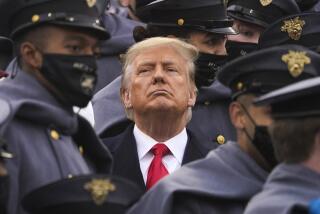Military on trial in Turkey
- Share via
The Turkish military has long served as the guardian of secular rule in Ankara, even when it meant staging a coup to do so. Turkey’s elected Islamist-based government, meanwhile, has sought to subordinate the military to civilian rule as befits a democratic country, although perhaps not always by the purest means.
Now, that simmering conflict has become a crisis, with police detaining about 50 senior military figures, 20 of whom have been charged in an alleged 2003 plot to overthrow the government. They include the former commanders of the navy and air force and the former deputy chief of staff of the military, leading to a heated national debate about what’s behind the arrests: Is there credible evidence against the highly respected commanders, or is the ruling Justice and Development Party concocting a scandal to eliminate its opponents? Is this a showdown between secular and religious ideology? Between military and civilian forces? Or is it a case of elites competing for the spoils of power?
Tensions between military and civilian leaders in Turkey are almost as old as the republic itself, founded by army officer Kemal Ataturk in 1923 on the principles of modern democracy, national unity and separation of religion and state. The army remained at the center of power for decades, carrying out four coups in the last 50 years and militantly enforcing secular rule. In 1997, the military ousted the first Islamist-led government, alleging it would introduce Sharia law. But the Islamic movement remained strong, and the Justice and Development Party won election in 2002. The military tried unsuccessfully to prevent Abdullah Gul from taking office as the country’s first Islamist president in 2007.
Since then, the government has been chipping away at the military’s hold on power. Scores of once untouchable current or former members of the military have been accused of coup plots over the last few years, sometimes based on illegal wiretaps leaked to the pro-government media. But the current crisis reaches into the highest levels yet. Five admirals and three generals are among those charged in connection with the alleged plot known as “Sledgehammer.” The charges are based on 5,000 pages of army documents that purportedly suggest the military intended to bomb two Istanbul mosques and provoke Greece into shooting down a Turkish plane over the Aegean Sea, creating chaos and setting the stage for a coup. The military denies the allegations, and critics suggest that the government is merely flexing its authoritarian muscles against opponents of an Islamist state.
This latest clash between the military and government comes as Turkey continues to push to join the European Union. Prime Minister Recep Tayyip Erdogan’s efforts to bring the military under civilian control is one of the political reforms he has undertaken toward that end, along with granting some rights to the country’s Kurdish minority and improving relations with neighboring Armenia. His government passed a law allowing officers to be tried in civilian courts, and it seeks to expand individual rights by overhauling the national constitution, which was written after a 1980 coup.
The West has pressed Turkey for such reforms, but at the same time, U.S. and European leaders have been torn between their commitment to democracy and their desire to ensure that a friendly government reigns over the strategically located, predominantly Muslim country. Turkey has historically served as a bridge between the West and the Middle East, and the military has facilitated that. Lately some have worried that Turkish overtures to Iran and Syria, and anger with Israel over the Gaza war, are indications of an increasingly Islamist foreign policy that is moving away from the West.
Others argue convincingly that Erdogan is turning toward his Arab and Islamic neighbors for new markets and an economic boost to help Turkey gain entry to the EU. Some add that he can serve as a mediator between East and West only if he is on good terms with both sides.
It is precisely Turkey’s desire to play a role as a regional power, as well as to join the EU, that makes this a critical moment. The U.S. and the EU have rightly called on the Turkish government to conduct the investigation into the alleged coup plot openly and in accordance with the law.
Indeed, just as the military must accept that the era of coups is past, the government must reject vendettas and political opportunism, and embrace the rule of law. This is an opportunity for Turkey’s government to serve as a role model by providing the military suspects with a fair civilian hearing.
More to Read
Sign up for Essential California
The most important California stories and recommendations in your inbox every morning.
You may occasionally receive promotional content from the Los Angeles Times.












